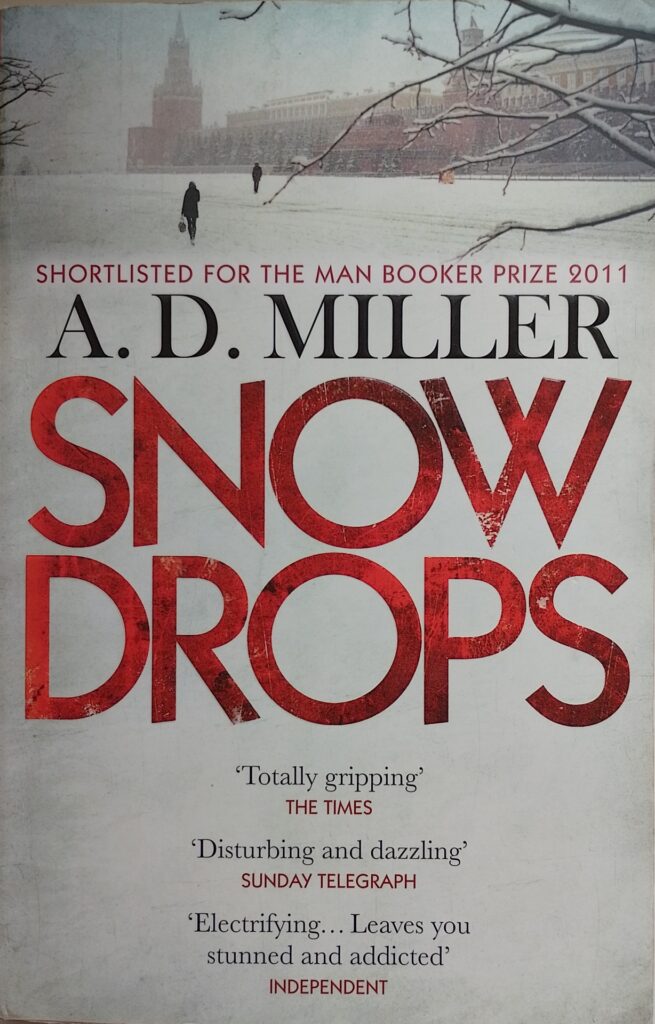First published 2011. Atlantic Books paperback, 2011, pp 273, c.55,000 words.
This book notoriously was shortlisted for the Booker Prize in 2011, the year that Stella Rimington, thriller writer and former head of MI5, declared that one of the criteria for the prize that year would be ‘readability’. Hurrah, who wants to read an unreadable book? One suspects that many of the critics had not actually read this book, having been fooled by the cover that this was some kind of Russia set thriller like (the excellent) Gorky Park or Kolymsky Heights, or may be a John Le Carré type spy novel. It has a picture on the white cover of the Kremlin in the snow and the title is picked out in blood red. The title adds to the impression, as does the back-cover explanation that ‘Snowdrops: That’s what the Russians call them – the bodies that float up into the light in the thaw’. Our expectations have been set that this is going to be a high-octane violent thriller. Only it isn’t.
What it is is the story of Nick Platt, a British expatriate lawyer working in Moscow in the early 2000s. He gets involved with a beautiful young Russian woman while working on a clearly suspect oil investment project. These two strands almost never touch. The Russian woman is up to suspect dealings of her own. Neither story is thrilling; more slow-burning moral decay, Graham Greene territory – returning were as tedious as to go o’er. Nick is mostly well drawn – truly human in his strengths and failings, twisting in the moral winds of his own creation, but most of the rest lack any depth and none are likable in the sense that we want to root for them.
Miller studied literature at university, we are told in the front section, and was The Economist magazine’s Moscow correspondent from 2004 to 2007, so he is surely an able and practised writer. This book is really about his feelings for Moscow and Russia in that period. It is a love letter – despite the chaos, blatant fraud, dog-eat-doggedness of it all, a Darwinian world, he found it raw and exciting. All the colours, emotions and experiences were vibrant and alive. Nothing was muted, little was polite. Anything could be bought, sold or stolen. The state hardly operated except when it was doing the stealing. As a piece of writing about a time and a place this is outstanding, even if occasionally it verges on the travel guide.
The structure of the book is a bit odd: it’s posed as a confession by Nick to his future bride about what he got up to while in Russia in the not-so-distant past. If I had received this from a fiancée, I would run a mile. Nick comes across as someone who sees his life now as being over and he would really rather be back in vibrant Moscow.
Miller writes very well, and from that point of view deserved his place on the Booker short list. He is also clear eyed about Russia: ‘I asked what she thought of the current weasel President (a mass murderer, like all Russian leaders as far as I could tell). She told me he was a good man, but he was only one good man against many bad ones, and he couldn’t solve all the problems by himself. She hushed her voice and looked around, even though she was being polite. I said, didn’t she mind that the people in charge seemed to spend half their time stealing? Yes, she said, of course she minded, but there was no point in putting new people in the Kremlin, because they’d just start the stealing all over again. At least the one’s in there now were already rich, so they could afford to think about other things too sometimes’ [p135].
This is a well written book that gives a very clear picture of Russia and its people. It is not a gripping thriller though. Readable? Yes, very. Highfalutin literature, maybe not.
Wikipedia biography of Miller: https://en.wikipedia.org/wiki/Andrew_Miller_(writer)
Wikipedia Summary of the book: https://en.wikipedia.org/wiki/Snowdrops_(novel)
Others’ reviews of the book: https://www.goodreads.com/book/show/9579671-snowdrops?ref=nav_sb_ss_1_9
© William John Graham, August 2024

